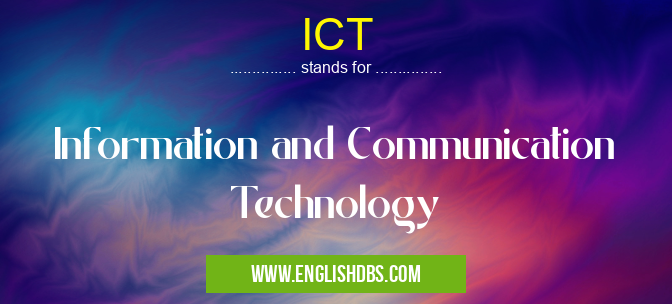What does ICT mean in
Information and Communication Technology (ICT) encompasses a broad range of technologies that facilitate the creation, storage, manipulation, and transmission of information. ICT has revolutionized the way we communicate, learn, work, and live.

ICT meaning in in Computing
ICT mostly used in an acronym in Category Computing that means Information and Communication Technology
Shorthand: ICT,
Full Form: Information and Communication Technology
For more information of "Information and Communication Technology", see the section below.
» Computing »
Key Points
- ICT refers to the convergence of computing, telecommunications, and broadcasting technologies.
- ICT enables the transmission of data, voice, and video over a variety of networks.
- ICT tools include computers, smartphones, tablets, software, and internet connections.
Benefits of ICT
- Enhanced Communication: ICT facilitates instant and efficient communication through email, social media, video conferencing, and instant messaging.
- Increased Productivity: ICT tools automate tasks, streamline processes, and provide access to vast amounts of information, improving productivity and efficiency.
- Improved Access to Education and Healthcare: ICT enables remote learning and telemedicine, expanding access to education and healthcare services.
- Economic Development: ICT drives innovation, creates new industries, and supports economic growth.
Examples of ICT in Practice
- Cloud computing: Allows users to access software, storage, and other resources over the internet instead of on their own devices.
- Artificial intelligence (AI): Machines are programmed to perform tasks that typically require human intelligence.
- Virtual reality (VR) and augmented reality (AR): Create immersive experiences that blur the line between the physical and digital worlds.
Essential Questions and Answers on Information and Communication Technology in "COMPUTING»IT"
What is the definition of Information and Communication Technology (ICT)?
ICT refers to the convergence of computing, communication, and information technologies. It encompasses a wide range of devices, software, applications, and services that enable the creation, storage, processing, exchange, and use of information and data.
What are the key components of ICT? A: The core components of ICT include: - Hardware: Physical devices such as computers, smartphones, tablets, and network infrastructure. - Software: Applications and operating systems that run on hardware and provide functionality. - Networks: Infrastructure that connects devices and allows data transmission. - Dat
The core components of ICT include:
- Hardware: Physical devices such as computers, smartphones, tablets, and network infrastructure.
- Software: Applications and operating systems that run on hardware and provide functionality.
- Networks: Infrastructure that connects devices and allows data transmission.
- Data: Information stored and processed by ICT systems.
- Services: Value-added offerings such as cloud computing, social networking, and e-commerce.
What are the benefits of using ICT?
ICT offers numerous benefits, including:
- Increased efficiency: Automating tasks and streamlining processes.
- Enhanced communication: Facilitating real-time communication and collaboration.
- Improved access to information: Providing easy access to vast amounts of data and knowledge.
- Innovation and growth: Driving new technologies and business models.
- Digital inclusion: Bridging the gap between those with and without access to technology.
What are the potential challenges of using ICT?
While ICT offers many advantages, it also poses certain challenges:
- Privacy concerns: Data breaches and misuse of personal information.
- Digital divide: Unequal access to and use of ICT across regions and demographics.
- Cybersecurity threats: Malicious attacks and data theft.
- Addiction to technology: Excessive use and potential negative impacts on health and well-being.
How does ICT impact different sectors?
ICT has a transformative impact on various sectors, such as:
- Education: Enhancing learning opportunities and providing access to online resources.
- Healthcare: Improving patient care through electronic health records and telemedicine.
- Business: Streamlining operations, improving customer service, and driving innovation.
- Government: Providing efficient services, increasing transparency, and engaging with citizens.
Final Words: ICT has become an integral part of modern society. It provides numerous benefits that enhance communication, productivity, access to information and services, and economic development. As technology continues to evolve, ICT will continue to play a crucial role in shaping our future.
ICT also stands for: |
|
| All stands for ICT |
